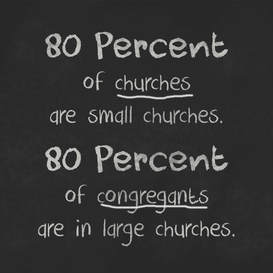|
-Rev Melissa Fain- Once again, this meditation came about as I'm writing Fig Tree Christian's Plan of Action. The General Church is dying.Here's what happened; Small churches began to feel the loss of congregants through death, moving, or general dissension. Those that left because of disagreements or moving, found larger congregations somewhere else. These larger congregations suddenly thought they must be doing something right. Their numbers were growing. This was the false positive of the 90's. The warning bells were sounding. Intelligent people began looking at the numbers. Church membership as a whole was in decline, but most of us couldn't see it, because we were leaving the declining churches. We were pooling our resources in bigger churches. This wasn't done knowingly. We simply sought congregations that had the resources. When we found those congregations, we added our resources to the mix, which in turn made the congregation more inciting for someone else looking for something like they left or something better.  I've heard this statistic thrown around, and I've personally tossed it around a few times myself: Eighty percent of of churches are small, and Eighty percent of congregants are in medium to large churches. That would mean most of the church population was feeling the false boom of the 90's when the problem first began. Meanwhile, we were horrible at evangelism. Back in the 50's the Greatest Generation (the ones who fought in WWII) basically bulldozed the the doors down to get in church. They simply wanted to be there so the church didn't have to try. That made us lazy. We stopped teaching evangelism, which meant no one was learning how to do it. Today, our numbers are mostly cannibalism of dead or dying churches. As we draw in to where the resources are, it is now only the mega-churches that are truly living into the world of false positives. All the other churches can feel the slow death upon them. Church plants! That's the answer, right? Guess which organization is currently planting churches today? That's right! Those who have the resources. Their survival is only because of what I just explained. This causes these organizations to falsely believe they are doing something right, when they are only doing what every other church has or is currently doing. They are only the lucky congregation that is receiving the dead's inheritance. When these churches plant, they seed mini-mes. In their mind it works for them so it must be right. Instead, their trademarked mini-me is one step closer to leading the Body of Christ to disaster. Well, that's depressing. What can be done? The simple answer is for these mega-churches to create a group of creative individuals to field test the potential for church today. Simple, but nearly impossible. Years ago when smaller churches were not bleeding out yet, I got one on my side. We began just what I mentioned. We explored our connection to God in today's society. Then traditional church began to slowly creep. By the time I stepped away, it was merely a praise service. It's exploration sucked away for comfort. The Traditional Creep- Creepy; not CatchyThat creep, my friends, is the biggest hurdle to reversing the course and growing the church. Back a few years ago, I compared this creep to something else: grafting. When it comes to plants, grafting can be great. Weaker trees with sweeter fruits can have their branches transplanted to heartier trunks. It's also a way to maintain integrity. Did you know every seed in an apple is a new breed of apple? Most of those breeds are just good ole' crab apple. To keep all our apples from being duds, branches from already grown trees are grafted to new saplings, keeping all those delicious flavors producing on new trees.
I submit this is a bad thing when it comes to the modern church. We graft the hell out of small churches. Follow me here, and I'll think you'll understand how this is bad: I've physically seen this a few times now, so it's more than an aberration. I equate calls, to God planting a seed in our heart. Now, that's pretty generalized, and I understand that, but I think it's also an accurate generalization. When God plants that call, it's for that specific call to be grown, and the uniqueness of that call is exciting. Yet, we get scared. No! Terrified! When that call is to plant a church, we get downright petrified we are being called to crab apples! So, at some point in it's infancy we oh so lovingly take a knife to God's call and oh so gingerly cut it's potential down to graft what we are comfortable with right on top. God has been trying to grow orchards for decades, filled with good fruit meant for the future Body of Christ, and we've been too afraid to trust God's call. We haven't been bold enough to say "no" when grafting happens. We must allow ourselves to sit in discomfort, because that's where God is calling us. Discomfort is not always bad. Discomfort is the feeling before growth. Discomfort is labor pains (which I personally know).Discomfort allows us to make tough decisions regarding letting go of things that no longer help us. Discomfort comes with the feeling of beginning something healthy. |
Categories
All
Archives
October 2023
|




 RSS Feed
RSS Feed